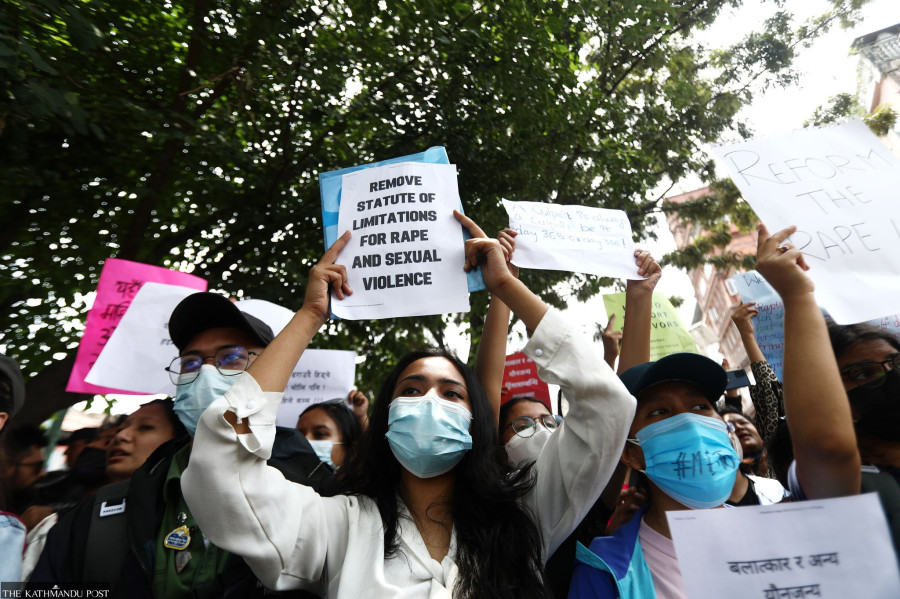National
Petition filed at the top court seeking removal of statute of limitations on rape
Six female lawyers who registered the petition claim the time limit is in violation of constitution.
Aakriti Ghimire
Six young female lawyers filed a petition at the Supreme Court on Tuesday demanding the removal of the statute of limitations on rape, in light of a former child actor’s accounts of rape and sexual violence that occurred eight years ago.
Advocates Mamta Siwakoti, Ojaswi KC, Ranjeeta Silwal, Dikshya Khadgi, Dikchya Raut and Salina Kafle jointly registered the petition stating that the statute of limitations under Section 292(2) of the National Penal Code is in violation of constitutional provisions—Article 21 of the ‘right of victim of crime’ and Article 38(3) under the ‘rights of women’.
Section (1) of Article 21 states, “a victim of crime shall have the right to get information about the investigation and proceedings of a case in which he or she is the victim.” Under section (2), “a victim of crime shall have the right to justice including social rehabilitation and compensation in accordance with the law”.
Article 38(3) states that “no woman shall be subjected to physical, mental, sexual, psychological or other forms of violence or exploitation on grounds of religion, social, cultural tradition, practice or on any other grounds. Such act shall be punishable by law, and the victim shall have the right to obtain compensation in accordance with the law.”
“A crime is a crime—whether one reports it a day later, a week later, two months later or even eight years later,” said Siwakoti, one of the advocates who filed the petition. “A procedural time limitation not just creates barriers to access justice for the victim but also violates two constitutional values, one that guarantees protection to victims of crime and the rights of women.”
Siwakoti added, “One of the fundamentals of justice is ensuring access to justice. But with the statute of limitations, access to justice is itself denied to many such victims of crime. It severely curtails primary human rights.”
The limitation of one year placed on reporting a crime as heinous as rape has barred a former child actor from filing a rape case against the man who she has accused of raping her.
On 18 May, the former child actor and model posted 20 videos on TikTok in which she shared explicit details of her horrific experiences. Explaining her account of multiple incidents of rape and sexual violence at the hands of multiple people, as early as 2014 when she was just 16 and just starting her modelling career, the woman, now 24, decried the statute of limitations as a major barrier to accessing justice.
According to Section 292(2) of the National Penal Code, a plaintiff can file a complaint only within a year of being raped.
The child actor was allegedly raped, first, eight years ago.
This has sparked the debate on the statute of limitations imposed on reporting rape, once again.
The statute of limitations on rape was extended from 35 days to 180 days through Act to Amend Laws to End Gender Violence and Ensure Gender Equality 2072, following the ‘Occupy Baluwatar Campaign’ in 2012.
In the Muluki Criminal Code 2017 which came into effect in August 2018, the statute of limitations was increased to one year.
However, this isn’t the first time that the Nepal government has been recommended to push for the removal of the statute of limitations on rape.
In 2018, the Convention on the Elimination of All Forms of Discrimination against Women (CEDAW), in its concluding observations on the sixth periodic report of Nepal, had recommended the Nepal government to repeal the statute of limitations provision on the registration of cases of sexual violence in all contexts to ensure effective access for women to justice for the crime of rape and other sexual offences.
Similarly, another study titled ‘Sexual Violence in South Asia: Legal and other barriers for justice to survivors’, jointly conducted by Dignity Alliance International and Equality Now, stated that applied to sexual violence cases, statutes of limitations have added an additional roadblock to access justice for the victims.
The report, revealed last year, has said Nepal has the shortest statute of limitations on sexual violence cases compared to other South Asian countries.
“Stigma, shame, intimidation, trauma, and even lack of recognition of the abuse keep many victims from coming forward and short statutes of limitations place an overwhelming burden on victims and allow perpetrators to evade punishment,” states the report. “The trauma, stigma, damage, and sometimes continuing threat and fear experienced as a consequence of sexual violence can prevent the victim from reporting the crime or delay reporting.”
The report has also pointed out that this might be particularly true in the context of childhood sexual violence when violations might not even be recognised as such by the victim until many years later, or in coercive domestic violence or intimate partner situations, or for example in the context of conflict, political violence or social disturbance.
“These various reports have demanded, time and again, the removal of the statute of limitations on rape,” says Raut, another advocate who has filed the petition. “And it is even more crucial for minors and conflict-era victims of rape. This is the government’s responsibility.”
According to lawyers, the existing law has not taken into account the stigma rape victims could face given the conservative society we live in. They say, this further silences the victims who have mustered up courage to speak up against the violence they face.
“What happened with the child actor is a representative case. As six lawyers who filed the petition, we represent the voices of the Nepali public who are demanding this change,” says Siwakoti. “When the state silences us with the statute of limitation, it further discourages so many victims of such heinous crimes.”




 13.12°C Kathmandu
13.12°C Kathmandu














